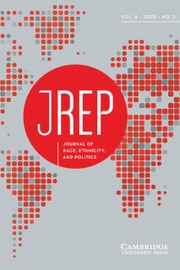Article contents
At the Borders of Identity: Identity Construction and Racial Bloc Voting
Published online by Cambridge University Press: 27 September 2019
Abstract
Why are some voters less likely to align with their group when group-based voting is both the norm and advantageous? I argue that the answer to this question can be found in the extent to which individuals are apparently consistent with the prototypical individual in their group. I develop a concept of racial distance, which improves upon the in-group out-group focus of the race and ethnic politics literature. Empirically, I investigate this relationship in South Africa using an original panel survey, which brackets the 2014 national elections. I find that those who are not readily identified as members of their group are less likely to vote with their group and more likely to change their vote due to an election campaign. Analyzing data from the South Africa 2016 the US 2012 elections suggests that this relationship holds for racial majorities but only minorities with a relatively weak sense of solidarity.
- Type
- Research Article
- Information
- Copyright
- Copyright © The Race, Ethnicity, and Politics Section of the American Political Science Association 2019
Footnotes
The author would like to thank Kanchan Chandra, Eric Dickson, Macartan Humphreys, and Cyrus Samii for excellent advisement. And for comments on earlier versions, I thank participants at the Contemporary African Political Economy Research Seminar (CAPERS), and participants at the Research Unit in Behavioral Economics and Neuroeconomics (RUBEN) and the Social Science Research Council (SSRC) Research Seminars at the University of Cape Town, participants in the General Research Seminar (AFS) in the Political Science Department of Gothenburg University, as well as Claire Adida, Leo Arriola, Pablo Barbera, Sarah Brierley, Danny Choi, Patrick Egan, Omar Garcia-Ponce, Jeremy Horowitz, Marcus Johnson, Kristen Kao, Franziska Keller, Yanna Krupnikov, Staffan Lindberg, Ellen Lust, Kyle Marquardt, Alan Potter, Collette Schulz-Herzenberg, Elizabeth Sperber, David Stasavage, and Shana Warren. All errors are my own. I also want to thank Mona Africa, Rasheda Ariefdien, Johan Eyssyen, Bernadette Johnson, and Feddie Stevens for excellent research assistance. This research was supported by the National Science Foundation under Grant Number 1323154. Funding for this project also came from the NYU Wilf Family Department of Politics, the NYU Africa House, the Center for Experimental Social Science (CESS) at NYU, and the Program on Governance and Local Development (GLD) at Gothenburg University.
References
REFERENCES
- 6
- Cited by


